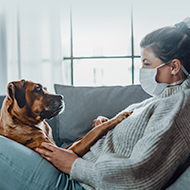
“There is currently no evidence to suggest that pets should be vaccinated.” - Daniella Dos Santos.
The British Veterinary Association (BVA) has published a statement in response to recent news reports about the possibility of vaccinating pets in order to curb the spread of COVID-19.
The news reports follow an editorial which was recently published in the journal Virulence. This article affirms the importance of encouraging vaccinations and other measures to tackle the virus among humans.
It also suggests that “the vaccination of domesticated animals might be required to halt further virus evolution and spillback events.”
In its response, the BVA urges the public not to panic; stating that there is currently no evidence which suggests that pets should be vaccinated.
BVA senior vice president Daniella Dos Santos said: “There have been a very small number of cases reported in pet animals worldwide. These are sporadic, single cases and in all incidents, it is likely that the transmission was from an infected human to their pet animal. There is no evidence that pets are passing COVID-19 to their owners.
“As the authors of the editorial say, sufficient vaccination coverage among humans will help to control the virus. While there is work ongoing globally to test Covid vaccines for animals, there is currently no suggestion that vaccinating animals should be a part of the immediate solution to curbing the pandemic.”
The BVA also added that this situation is continually monitored by the World Organisation for Animal Health (OIE), as well as the association's chief veterinary officers.



 The Veterinary Medicines Directorate (VMD) is inviting applications from veterinary students to attend a one-week extramural studies (EMS) placement in July 2026.
The Veterinary Medicines Directorate (VMD) is inviting applications from veterinary students to attend a one-week extramural studies (EMS) placement in July 2026.